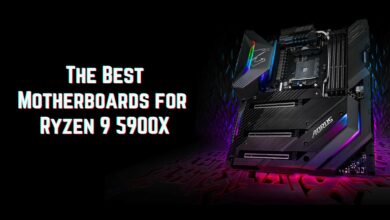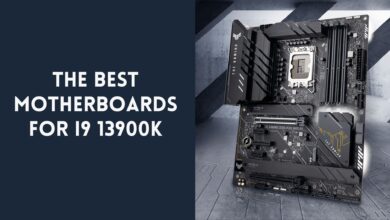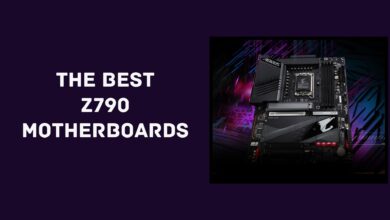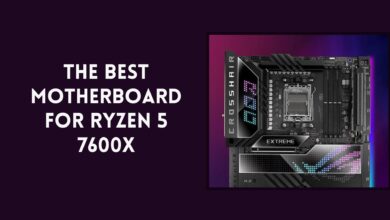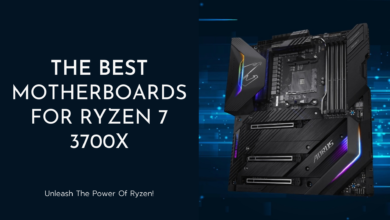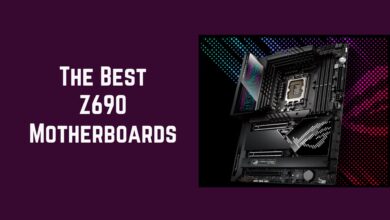7 Best AM5 Motherboards In 2024 According To Experts
The highly anticipated release of AMD’s Ryzen 7000 CPU family, featuring the Zen 4 architecture, has taken the gaming industry by storm. The new AMD CPUs have swept the competitors aside and immediately challenged for the gaming crown. If you have managed to get your hands on one of these new AMD AM5 CPUs during the launch, you will need to invest in a new motherboard that maximizes the capabilities of the AM5 platform.
The reason behind this necessity is that the AM5 platform is entirely new and exclusively designed for the Ryzen 7000 series CPUs. Along with a fresh chipset and socket, AMD is also introducing a range of new technologies with this platform, including support for DDR5 memory and PCI Express 5.0.
To harness the full power of the new cutting-edge CPUs, you should consider getting one of the latest X670E or B650E motherboards. While our recent review covered the best motherboards for Ryzen 9 7950X, those models primarily catered to the premium market segment.
To help you find the right match for your AMD AM5 CPU, we’ve compiled a list of some of the best AM5 motherboards currently available on the market. Let’s dive right into the options.
The Best AM5 Motherboard in 2024 – Our Choices
| # | Preview | Product Name | Award | Details |
|---|---|---|---|---|
| 1 | 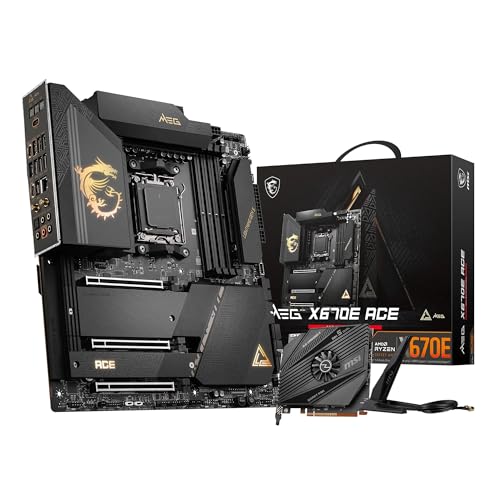 | MSI MEG X670E ACE | Best Overall AM5 Motherboard | Check Price |
| 2 | 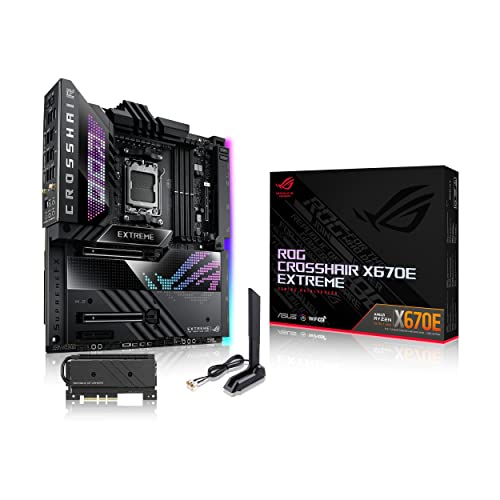 | ASUS ROG Crosshair X670E Extreme | Best Premium AM5 Motherboard | Check Price |
| 3 | 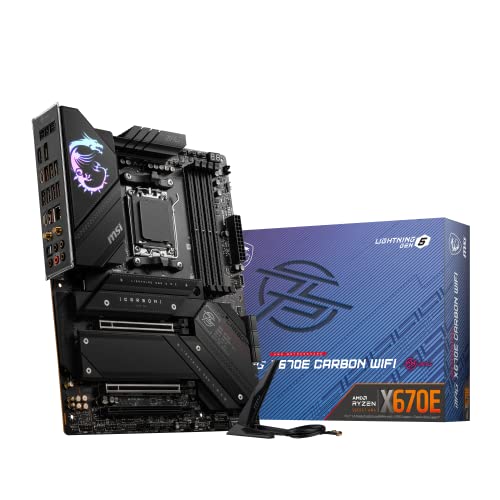 | MSI MPG X670E Carbon WiFi | Best Overclocking AM5 Motherboard | Check Price |
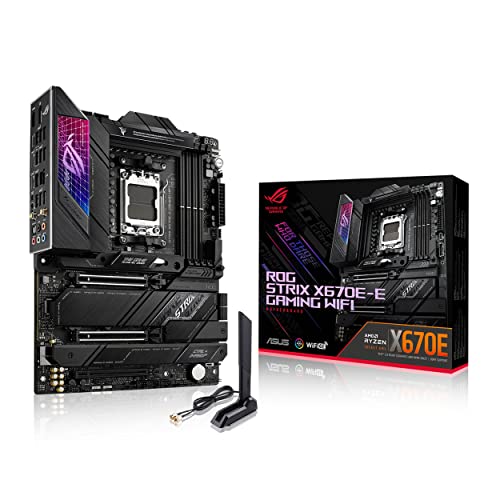 | ASUS ROG Strix X670E-E Gaming WiFi | Best Looking AM5 Motherboard | Check Price | |
| 5 | 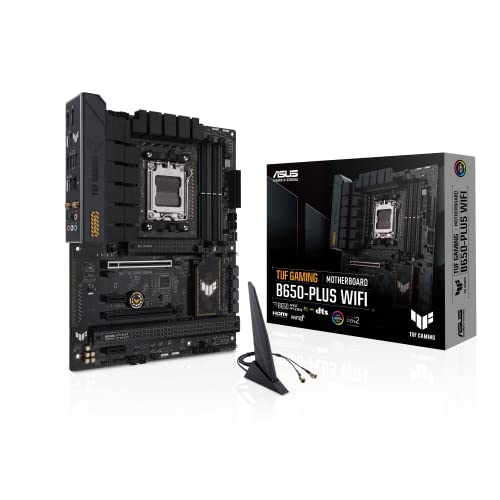 | ASUS TUF Gaming B650-PLUS WiFi | Best Value AM5 Motherboard | Check Price |
| 6 | 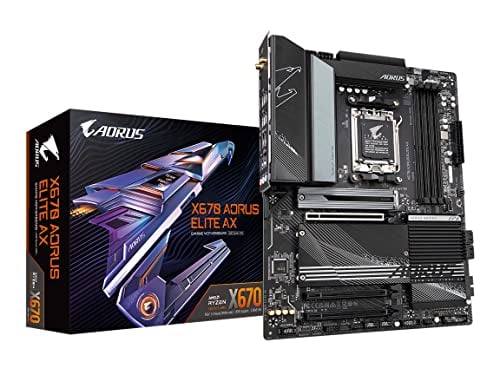 | Gigabyte X670 AORUS Elite AX | Best Budget AM5 Motherboard | Check Price |
| 7 | 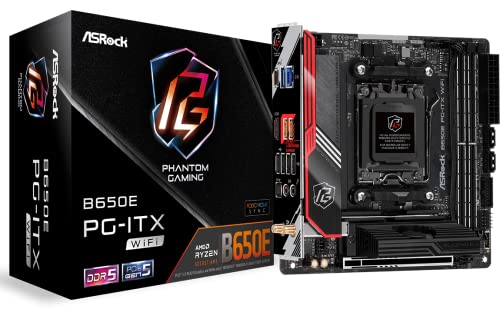 | ASRock B650E PG-ITX WiFi | Best Mini ITX AM5 Motherboard | Check Price |
| # | 1 |
| Preview |  |
| Product Name | MSI MEG X670E ACE |
| Award | Best Overall AM5 Motherboard |
| Details | Check Price |
| # | 2 |
| Preview |  |
| Product Name | ASUS ROG Crosshair X670E Extreme |
| Award | Best Premium AM5 Motherboard |
| Details | Check Price |
| # | 3 |
| Preview |  |
| Product Name | MSI MPG X670E Carbon WiFi |
| Award | Best Overclocking AM5 Motherboard |
| Details | Check Price |
| # | |
| Preview |  |
| Product Name | ASUS ROG Strix X670E-E Gaming WiFi |
| Award | Best Looking AM5 Motherboard |
| Details | Check Price |
| # | 5 |
| Preview |  |
| Product Name | ASUS TUF Gaming B650-PLUS WiFi |
| Award | Best Value AM5 Motherboard |
| Details | Check Price |
| # | 6 |
| Preview |  |
| Product Name | Gigabyte X670 AORUS Elite AX |
| Award | Best Budget AM5 Motherboard |
| Details | Check Price |
| # | 7 |
| Preview |  |
| Product Name | ASRock B650E PG-ITX WiFi |
| Award | Best Mini ITX AM5 Motherboard |
| Details | Check Price |
Last Update on 2024-09-18 at 21:42 / Affiliate links / Images from Amazon Product Advertising API
1. MSI MEG X670E ACE
Best Overall AM5 Motherboard
Pros
- Robust VRM Design
- Features 10 GbE LAN
- Superb Storage Features
- Loads of USB Ports
Cons
- Quite Expensive
Chipset: X670 | Power Delivery: 22+2+1 Phase VRM | Memory: 4x DIMM, 128GB, DDR5-6666+ | Video Outputs: USB-C, DisplayPort | USB Ports: 11x rear IO, 10x internal | Network: 1x 10 GbE LAN, 1x Wi-Fi 6E | Storage: 4x M.2, 6x SATA | Form Factor: E-ATX
MSI’s ACE motherboards have garnered quite a positive reputation among enthusiasts for their top-notch performance and superb feature set, and the same trend can be seen in the MEG X670E ACE. This iteration is a premium offering by MSI for the AMD AM5 platform, and it falls just below the lavish MSI X670E GODLIKE in their product stack. Nevertheless, its excellent features and ridiculous power delivery makes it the best overall AM5 motherboard on our list.
We picked this motherboard as the absolute best motherboard for Ryzen 5 7600X as well.
We cannot start analyzing the X670E ACE without going through its power delivery system. Under the gigantic VRM heatsinks, MSI has equipped the board with a robust 22+2+1 phase VRM design with 90A power stages. This extraordinary power delivery system is capable of handling even the flagship Ryzen 9 7950X3D CPU at overclocked settings. With PBO enabled, you will be able to maximize the potential of every single AMD Ryzen CPU on the AM5 platform.
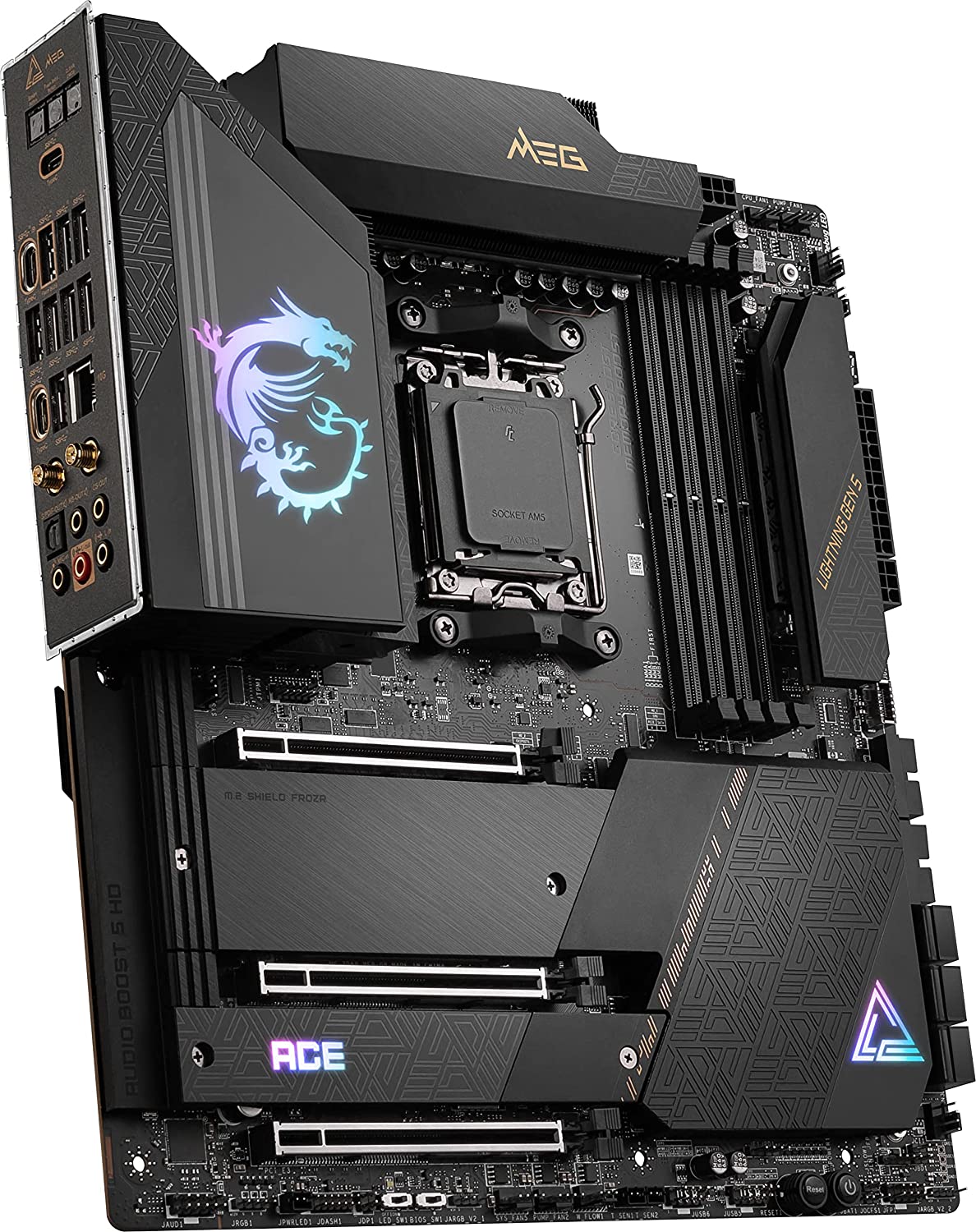
This prowess is further empowered by the ingenious VRM cooling solution implemented by MSI. The board uses two heatsink assemblies joined together via a direct-touch heat pipe, which significantly improves thermal dissipation, especially when CPU overclocking. The VRM heatsinks themselves use a stacked fin array design to maximize surface area, resulting in comfortable VRM temperatures even under prolonged loads.
Being a premium AM5 motherboard, the X670E ACE makes no compromises in the features department. The board is jam-packed with high-end connectivity and storage features to cater to the needs of enthusiasts. Storage is handled by four M.2 slots, two of which comply with PCIe 5.0 speeds as well. Moreover, in addition to WiFi 6E, the board provides 10 Gigabit networking which is a massive advantage for content creators and professionals who can leverage the additional bandwidth. The rear I/O is packed with high-speed USB ports and even a USB-C display output if you ever need to use integrated graphics.
MSI doesn’t just dominate in the AMD market, as their premium option was selected in our roundup of the best motherboards for i9 12900K.
Aesthetics are often considered the weak point of MSI motherboards, as they tend to go a bit overboard and dramatic. However, the MSI X670E ACE flips the script and carries a very understated and minimalist design language. If you can ignore the glaring RGB dragon on the I/O cover, the rest of the board is covered with massive all-black heat spreaders with subtle accents in gold and silver. This gives the board a very sophisticated personality, with the right balance of customization as well.
Of course, the X670E ACE does fall toward the premium end when it comes to the price tag. However, its price-to-performance ratio is actually quite positive given its extraordinary VRM design and the option of 10 Gigabit networking. Granted, the initial investment is a bit steep, but it can definitely be worth it in the long run. If you’re looking for a top-tier AM5 motherboard for your high-end build, it is hard to go wrong with the MSI X670E ACE.
2. ASUS ROG Crosshair X670E Extreme
Best Premium AM5 Motherboard
Pros
- Extraordinary 22 Phase VRM
- Support For 10 Gigabit Networkign
- Five M.2 Slots
- Exceptional Connectivity
Cons
- Very Expensive
Chipset: X670 | Power Delivery: 20+2 Phase VRM | Memory: 4x DIMM, 128GB, DDR5-6400+ | Video Outputs: 2x Thunderbolt 4 USB-C | USB Ports: 12x rear IO, 10x internal | Network: 1x 10 GbE LAN, 1x 2.5 GbE LAN, 1x Wi-Fi 6E | Storage: 5x M.2, 6x SATA | Form Factor: E-ATX
The ASUS Crosshair brand has become synonymous with premium AMD motherboards that make no compromises to deliver the absolute highest quality and performance. The ROG Crosshair X670E Extreme is the flagship variant from that esteemed lineup, and it stays true to the aforementioned trend. Although vastly expensive, the X670E Extreme brings an unparalleled feature set and is worthy of being labeled the best premium AM5 motherboard.
Keeping pricing to one side, we can safely say that the ASUS ROG Crosshair X670E Extreme is one of the best motherboards for gaming on the X670 platform.
Arguably the most compelling feature of the ROG Strix X670E is the top-notch VRM design, which utilizes a teamed 20+2 phase layout and 110A-rated power stages. This allows for efficient power delivery and enables substantial overclocking potential for even the Ryzen 9 7950X3D CPU. The dual 8-pin power connectors are reinforced and allow the board to draw up to a whopping 1000W of power for the CPU alone.
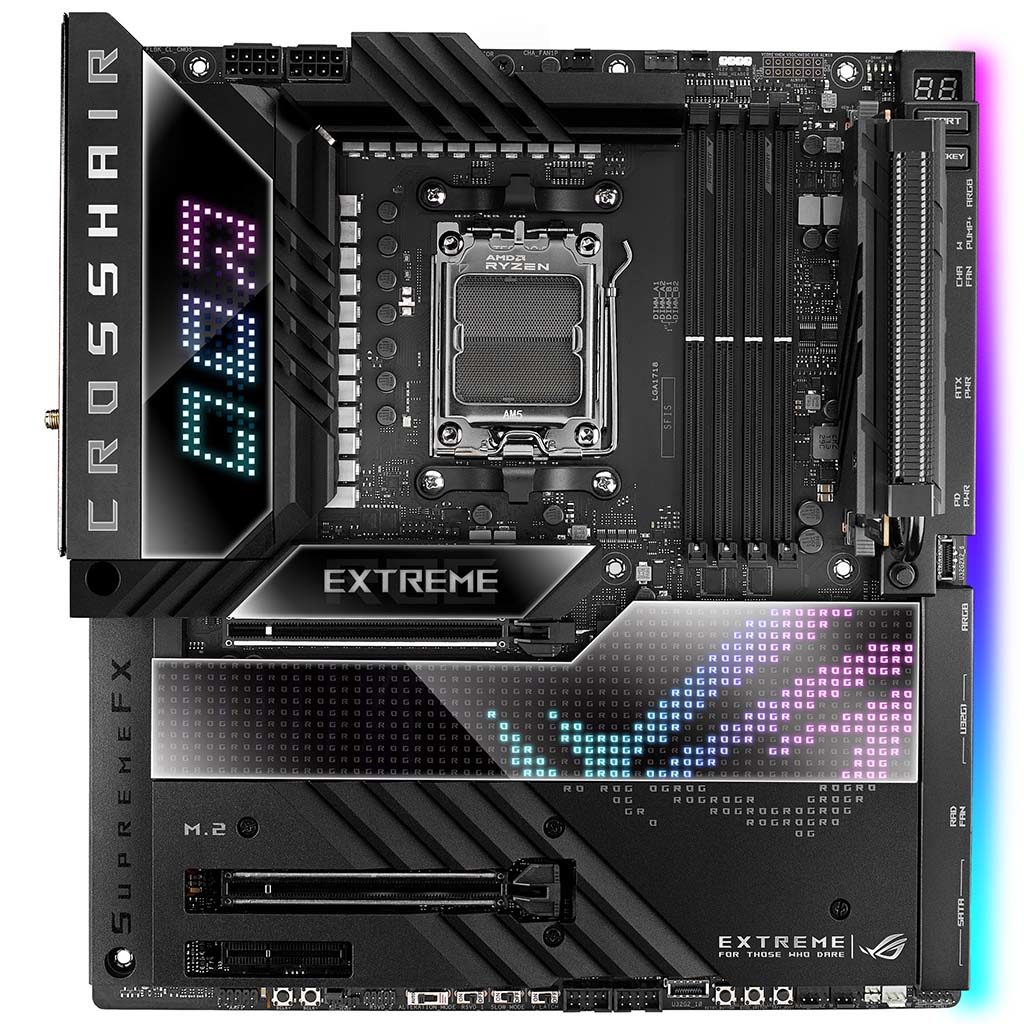
ASUS has also reinforced the power delivery system with exceptional cooling capabilities. The VRM is effectively cooled by a gigantic multi-piece heatsink, making it one of the best options for overclocking. The heatsinks use a fin-stack array to maximize surface area, while the MOSFETs make direct contact with a large heat pipe to further improve heat dissipation. Rest assured, the board handles VRM temperatures exceptionally well in any likely situation, even under prolonged loads.
A similar ASUS option was selected in our list of the best motherboards for Ryzen 5 3600 as well.
The motherboard is designed to cater to users who require high-performance gaming and intense productivity work. It includes dual high-speed LAN ports and Wi-Fi 6E for fast and reliable networking. The presence of 10 Gigabit networking further enhances its appeal, as content creators and creative professionals will rejoice at the availability of that feature.
For storage, there are five M.2 slots for expansion, with three of them supporting PCIe Gen 5 speeds and the rest capable of Gen 4 speeds. On the rear I/O, one can find multiple high-speed USB ports, including two Type-C Thunderbolt 4 ports, and support for multiple displays that make it well-equipped for connectivity.
ASUS dominates the Intel motherboard market too, as the brand made its way into our roundup of the best Z790 motherboards too.
Aesthetically, the Crosshair X670E Extreme stands out with its sleek and stylish design, featuring a black color scheme complemented by unique RGB lighting patterns. The entire PCB is covered by massive heat spreaders and various covers that prevent you from having to glance at the bare PCB traces. The design elements, such as a retro pattern inspired by 8-bit video games of the 80s, give the motherboard a distinct look that can be customized using the ASUS AURA Sync software. The board truly stands out from the crowd thanks to its appealing design language.
Considering its features and performance, the Crosshair X670E Extreme is a top choice to pair with any high-end AMD AM5 CPU, offering quality and versatility. However, it comes with a significant drawback—the steep price tag. Its top-notch VRM, extensive connectivity options, and stylish design make it a compelling option, which is reflected in its higher pricing. Nevertheless, if affordability is not an issue, the ASUS ROG Crosshair X670E Extreme is a worthwhile investment for enthusiasts who only want the best of the best.
3. MSI MPG X670E Carbon WiFi
Best Overclocking AM5 Motherboard
Pros
- Superb Overclocking Prowess
- Versatile Features
- Nice Aesthetics
- USB-C Display Output
Cons
- Relatively Pricey
Chipset: X670 | Power Delivery: 18+2 Phase VRM | Memory: 4x DIMM, 128GB, DDR5-6600+ | Video Outputs: USB-C, HDMI, DisplayPort | USB Ports: 10x rear IO, 9x internal | Network: 1x 2.5 GbE LAN, 1x Wi-Fi 6E | Storage: 4x M.2, 6x SATA | Form Factor: ATX
The performance-focused MPG Carbon lineup from MSI has some interesting offerings for the AM5 platform, and the X670E variant makes a strong case. The X670E Carbon WiFi is one of the most well-rounded motherboards on the market at the time of writing, covering all the bases in an efficient manner without exposing any major flaws. Its extraordinary VRM design makes it the best overclocking AM5 motherboard in its particular price bracket.
We chose a similarly-priced MSI motherboard in our roundup of the best motherboards for Ryzen 9 5900X as well.
Speaking of overclocking, the power delivery system of the X670E Carbon WiFi immediately stands out. With a powerful 18+2 phase VRM design with 90A power stages under the hood, the X670E Carbon WiFi is equipped to handle even the most demanding AM5 CPUs at their maximum potential. With the X670E Carbon WiFI, you can even try your hand at manual overclocking with flagship Ryzen 7000 series CPUs like the Ryzen 9 7950X3D.
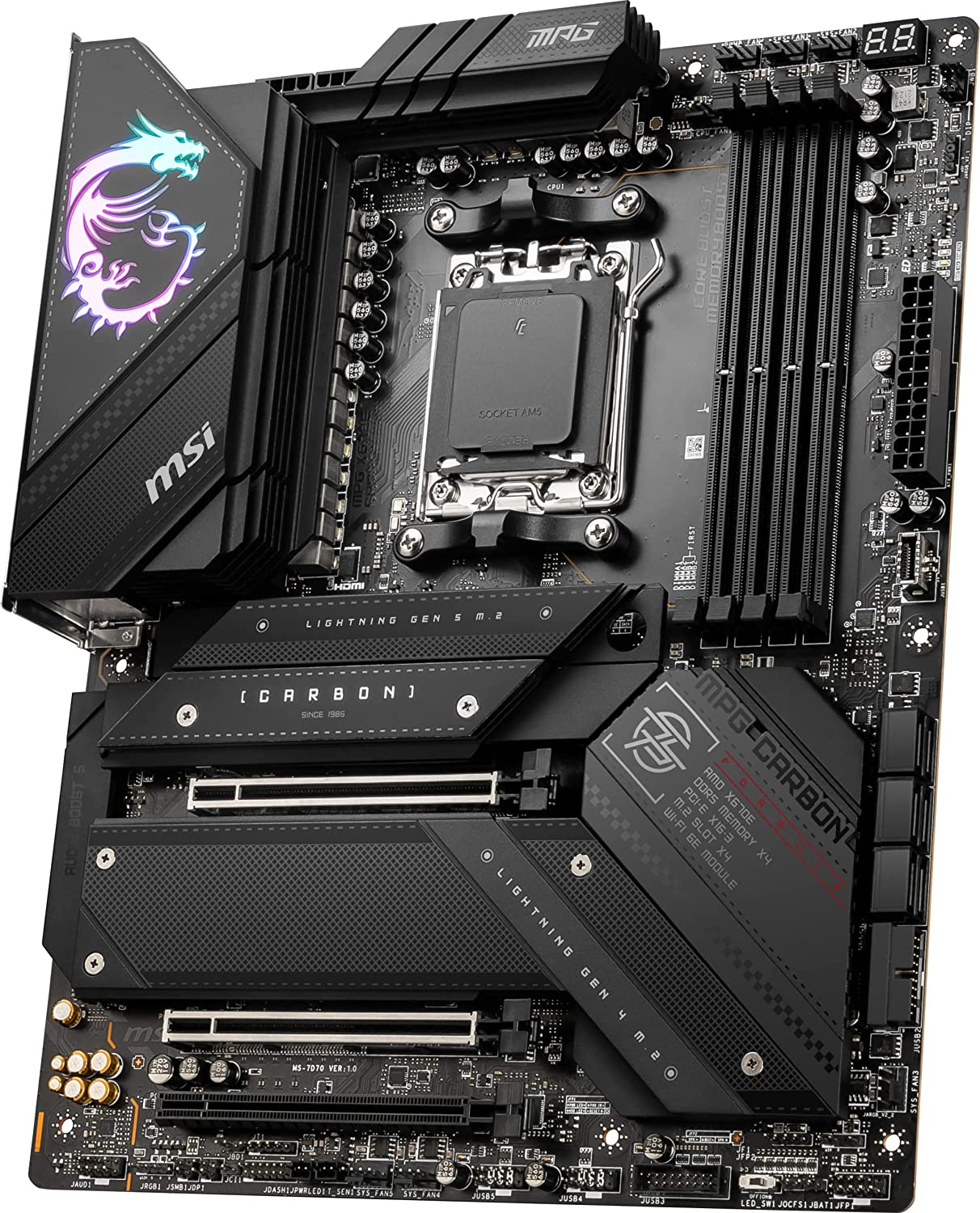
Further improving the power delivery design is the cooling solution implemented by MSI. One glance at the board reveals the two gigantic VRM heatsinks that keep the MOSFETs and chokes running comfortably. The multi-piece heatsinks have adequate finning that improves surface area and consequently, thermal dissipation.
On to the features, the MPG X670E Carbon WiFI does not have any glaring deficiencies in this department. In fact, the networking suite is rather standard with a 2.5 GbE LAN port and WiFi 6E, while the storage is handled by four M.2 slots that offer a variety of PCIe configurations. Connectivity is also quite reasonable, with the USB-C display output on the rear I/O being the standout feature. The board also offers several high-speed USB ports of various types, thus rounding out a very satisfactory connectivity suite.
A similar MSI option was also selected in our roundup of the best motherboards for i5 12600K.
Aesthetics are a subjective matter, but the X670E Carbon WiFi does have a rather nice outlook to it. It conforms to MSI’s new and refreshing design philosophy with understated patterns and a stealthy overall facade. The large, glowing, RGB Dragon logo on the top left is still a rather polarizing choice, but its Mystic Light does provide a sharp contrast to the rest of the board and is a source of lighting as well. The design is rather inoffensive and should go well with most builds.
When it comes to mid-range AM5 motherboards, you are better off going for the high-performance options such as the X670E Carbon WiFi, instead of something that offers worse value for money. While it is not an inexpensive motherboard, the price-to-performance ratio of the MPG X670E Carbon WiFi is very impressive and makes it a firm recommendation for anyone who wants to build a high-end desktop build around the AM5 platform.
4. ASUS ROG Strix X670E-E Gaming WiFi
Best Looking AM5 Motherboard
Chipset: X670 | Power Delivery: 18+2 Phase VRM | Memory: 4x DIMM, 128GB, DDR5-6400+ | Video Outputs: HDMI, DisplayPort | USB Ports: 13x rear IO, 9x internal | Network: 1x 2.5 GbE LAN, 1x Wi-Fi 6E | Storage: 4x M.2, 4x SATA | Form Factor: ATX
With the mid-range option in the ASUS ROG motherboard lineup, we have the ASUS ROG Strix X670E-E Gaming WiFi, which carries a rather confusing name. Keeping that to one side, this particular option is the mainstream X670E option in the ROG lineup, targeting the high-end performance bracket. While it is not an inexpensive motherboard, it certainly is a lot more feasible than some of the more lavish offerings in the premium AM5 market.
More premium ASUS motherboards can be found in our list of the best motherboards for i7 12700K.
For users who want to configure a build around a premium AM5 CPU, the ASUS ROG Strix X670E-E Gaming WiFi is a compelling choice. ASUS has equipped this board with an impressive 18+2 phase VRM design, concealed under substantial VRM heatsinks. This robust setup promises exceptional overclocking capabilities in line with ASUS and AMD’s expectations for X670E motherboards. One can even pair the X670E-E with the powerful AMD Ryzen 9 7950X3D and expect reasonable overclocking freedom.
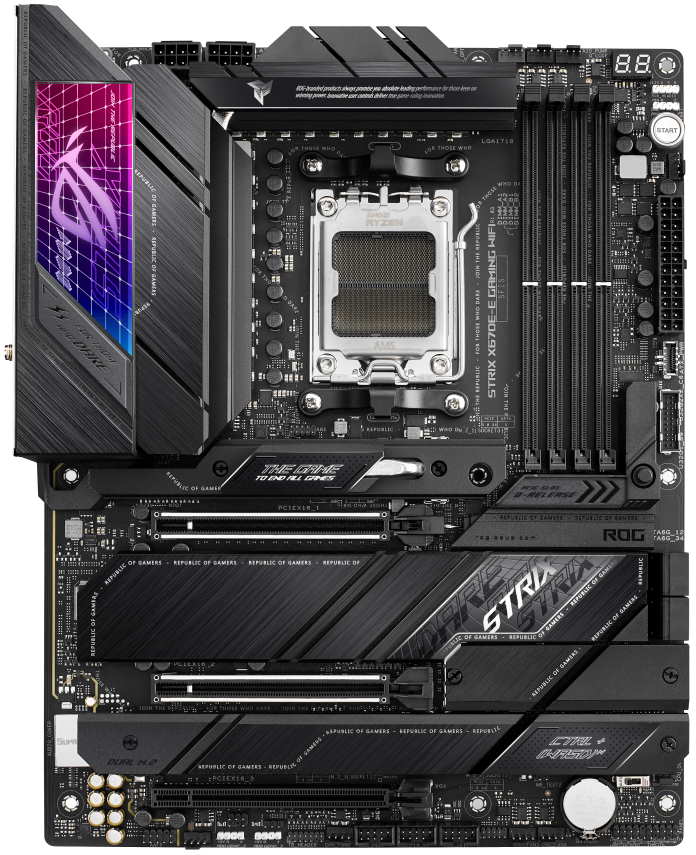
Additionally, the VRM cooling ensures stable performance even when pushing the Ryzen 9 7950X to its limits through overclocking. The multi-piece heatsink array works well in tandem with residual airflow from the CPU cooler to maximize heat dissipation from the MOSFETs and chokes.
On the feature front, the ASUS ROG Strix X670E-E Gaming WiFi doesn’t disappoint. While not as extravagant as the Crosshair series, it offers a well-rounded set of options that cater to most gamers and enthusiasts. Notably, the networking suite boasts a 2.5 GbE LAN port, though some productivity-focused users might have preferred a 10 GbE option. You also get the standard WiFi 6E option for wireless connectivity, of course.
A similar ASUS option was picked in our roundup of the best motherboards for Ryzen 5 5600X.
Storage needs are well-addressed with four M.2 slots, boasting impressive speeds to accommodate the latest storage solutions. The rear I/O is thoughtfully equipped with loads of high-speed USB ports as well as different display outputs that can come in handy should you need to use integrated graphics.
ASUS has stayed true to its design philosophy, evident in the striking aesthetics of the ROG Strix X670E-E Gaming WiFi. The motherboard exudes ASUS’s signature style with its sleek and angular appearance, perfectly aligned with the ASUS ROG design language. The inclusion of ample RGB lighting on the I/O cover and the ROG script on the chipset heatsink further adds to its allure, making it an ideal choice for RGB enthusiasts. It stands out as the best-looking AM5 motherboard in our roundup, which is a rather unique position in the current market.
Once you take into account its positive value proposition, the ASUS ROG Strix X670E-E Gaming WiFi motherboard offers an overall impressive package. While some may find the naming scheme and design slightly excessive, its performance and feature set justify its higher price point. Potential buyers should be aware of its premium cost but will find a reliable and high-performing partner for their premium AM5 CPU. If you seek a top-tier, visually captivating motherboard with strong overclocking potential, the ASUS ROG Strix X670E-E Gaming WiFi undoubtedly fits the bill.
5. ASUS TUF Gaming B650-PLUS WiFi
Best Value AM5 Motherboard
Pros
- Solid Build Quality
- Impressive VRM Design
- Relatively Affordable
Cons
- No RGB Lighting
- Few Rear USB Ports
Chipset: B650 | Power Delivery: 12+2 Phase VRM | Memory: 4x DIMM, 128GB, DDR5-6400+ | Video Outputs: HDMI, DisplayPort | USB Ports: 8x rear IO, 10x internal | Network: 1x 2.5 GbE LAN, 1x Wi-Fi 6E | Storage: 3x M.2, 4x SATA | Form Factor: ATX
The ASUS TUF B650-PLUS WiFi is a top choice among B650 motherboards in the AM5 lineup, offering a blend of versatility and value that is hard to match. The B650 chipset is lauded by gamers as the sweet spot between value and performance, and the same theme applies to the TUF Gaming series of motherboards by ASUS. With its exceptional build quality and attractive value, the ASUS TUF B650-PLUS WiFi is our pick for the best value AM5 motherboard on the market.
Speaking of budget offerings, you can also explore our selection of the best budget AM4 motherboards for more options on a strict budget.
ASUS has not made any compromises when it comes to the power delivery of the TUF B650-PLUS. Conforming to its high-end standards, the board boasts a 12+2 phase VRM design with 60A power stages, making it well-equipped for handling manual overclocking on most Ryzen 7000 series CPUs. The VRM is effectively cooled by a twin VRM heatsink array with ample surface area, ensuring efficient heat dissipation from MOSFETs and chokes. The large heatsink assembly is designed with pass-through areas for residual airflow to further improve the cooling of the VRM components.
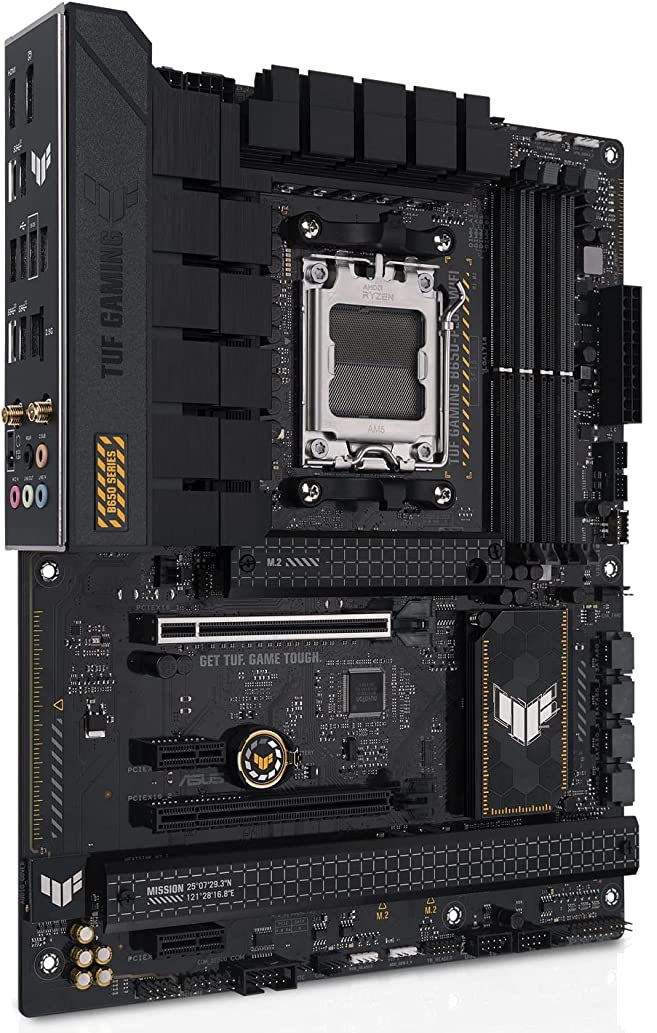
Despite its affordable price, the TUF B650-PLUS comes packed with useful features. The BIOS flashback feature is convenient for flashing the BIOS without a CPU or memory, and the board includes 4x ARGB/RGB headers configurable with ASUS AURA Sync.
Connectivity-wise, the board remains impressive, retaining PCIe 5.0 connectivity in one of its three M.2 slots and providing 4 SATA ports for traditional drives. Networking features a 2.5 GbE LAN port along with WiFi 6 for wireless connectivity. The rear I/O includes a standout USB 3.2 Gen 2×2 20Gbps port and other high-speed ports, showcasing the board’s commitment to delivering comprehensive connectivity.
Intel Alternatives: Best Z790 Motherboards
As expected from TUF Gaming motherboards, the B650-PLUS excels in build quality. It incorporates TUF chokes and capacitors with a claimed 52% better temperature tolerance and 2.5X lifespan, along with TUF LANguard for higher surge tolerance and SafeSlot+ steel reinforcement for improved slot durability. Additional on-circuit ESD transient voltage suppression adds an extra layer of protection. These additional improvements give the TUF B650-PLUS its unique position in the market and separate it from the crowd.
A similar ASUS option was selected in our list of the best motherboards for Ryzen 5 3600 as well.
The board’s design follows the simplistic and rugged aesthetic of the TUF Gaming lineup, with understated looks and overbuilt heatsinks that exude durability. Although lacking RGB lighting, the board provides external RGB device support via onboard headers for personalization options. The all-black aesthetic of the board is quite ideal if you are going for a stealthy or understated build like a workstation.
With its inherent value advantage over competing X670 motherboards, the TUF Gaming B650-PLUS targets mainstream gamers seeking excellent bang for their buck. It strikes a balance between affordability and features, making it one of the best B650 motherboards available for AM5 processors. Although it does have a few missing features here and there, the overall package is quite attractive for the price, making it a very reliable choice for mainstream gamers who want the best-value AM5 motherboard for their new build.
6. Gigabyte X670 AORUS Elite AX
Best Budget AM5 Motherboard
Pros
- Affordable Price Point
- Solid Connectivity
- Decent Storage Options
Cons
- Unremarkable VRM Cooling
- Limited RGB Lighting
Chipset: X670 | Power Delivery: 16+2+2 Phase VRM | Memory: 4x DIMM, 128GB, DDR5-6666+ | Video Outputs: HDMI | USB Ports: 13x rear IO, 9x internal | Network: 1x 2.5 GbE LAN, 1x Wi-Fi 6E | Storage: 4x M.2, 4x SATA | Form Factor: ATX
Towards the budget end of the market, the Gigabyte X670 AORUS Elite AX pairs perfectly with the majority of AM5 CPUs, even if you plan on overclocking. If you’re looking to avoid breaking the bank on a new motherboard, this option from the X670 tier provides a reasonable choice, without compromising on performance entirely, though it does sacrifice some features.
Gigabyte has equipped the X670 AORUS Elite AX with a reliable 16+2+2 phase VRM system, ideal for handling moderate overclocking in most CPUs, but not suited for extreme overclocking experiments with premium AM5 CPUs. This motherboard is more suited towards mid-range AM5 CPUs, as we named it one of the best motherboards for Ryzen 7 7700X.
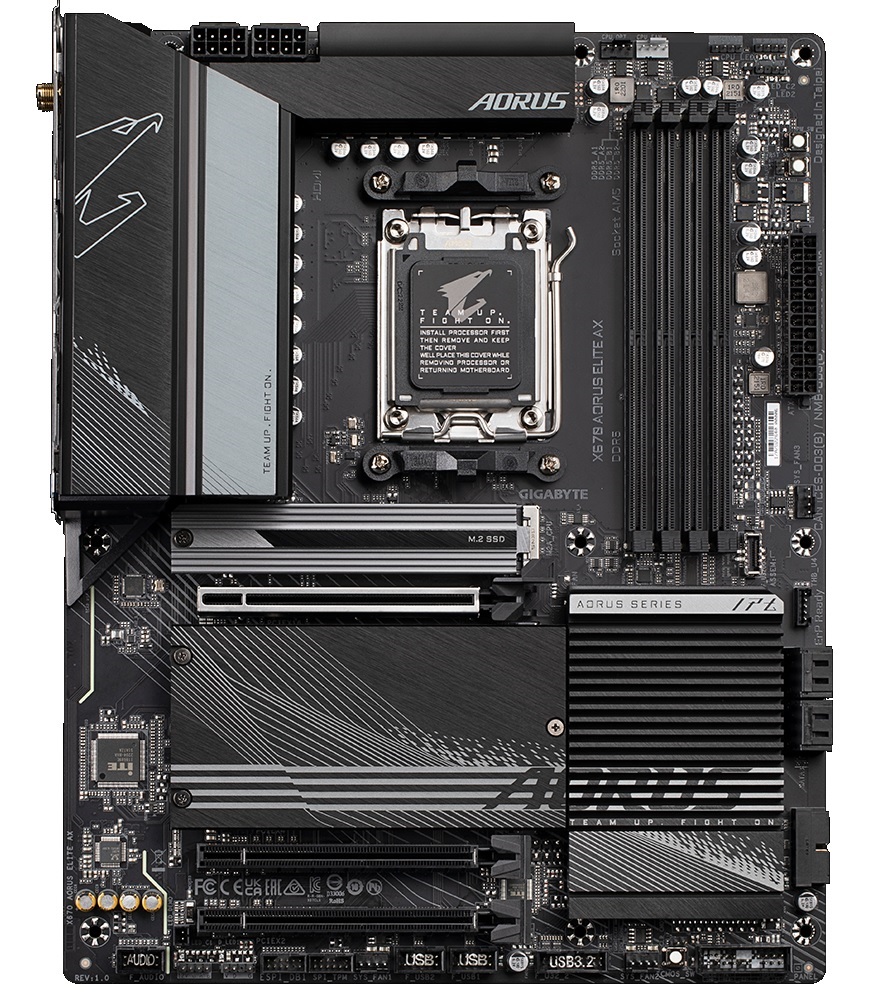
The VRM cooling is adequate, although nothing spectacular, and the VRM temperatures remain stable and well-controlled thanks to the large heatsinks used in this design. This VRM cooling solution significantly enhances the overall power delivery performance both in the short and long term.
In terms of features and affordability, the X670 AORUS Elite AX exceeds expectations. The networking options are on par with more expensive motherboards, and the number of M.2 slots is respectable for its price category, with one slot capable of supporting PCIe 5.0 speeds. The rear I/O also offers a pleasant surprise, as the board is rife with loads of high-speed USB ports that will come in handy for those gamers who like to use a lot of peripherals. The feature set is surprisingly well-stocked for a motherboard in this performance category, especially considering the value that it offers.
Speaking of affordable motherboards, you can also check out our shortlist of the very best B550 motherboards on the market.
While its aesthetic appearance may be described as modest, it still manages to impress, especially when compared to the premium motherboards on our list. The board is covered with black shrouds and heatsinks, but the AORUS design on the right bottom part remains visible and adds a touch of style. For those who appreciate RGB lighting, there is a small lighting strip on the I/O cover that enhances the board’s overall appeal. Some users may prefer a more generous use of RGB lighting, but the AORUS Elite does not conform to that design choice.
Considering the value it offers, the Gigabyte X670 AORUS Elite AX stands out as the top choice for value hunters who want to craft a new AM5 build on a budget. It is fully capable of complementing the performance of the majority of AM5 CPUs while being reasonably priced, earning it the title of the best budget AM5 motherboard in our roundup. Its reliable power delivery system and moderate overclocking capabilities make it a perfect match for mid-range AM5 CPUs in particular.
7. ASRock B650E PG-ITX WiFi
Best Mini ITX AM5 Motherboard
Pros
- Ideal For Compact PCs
- Superb Feature Set
- Solid VRM Design
Cons
- Limited Expansion
- No RGB Lighting
Chipset: B650 | Power Delivery: 10+2+1 Phase VRM | Memory: 2x DIMM, 96GB, DDR5-6400+ | Video Outputs: HDMI, DisplayPort | USB Ports: 8x rear IO, 5x internal | Network: 1x 2.5 GbE LAN, 1x Wi-Fi 6E | Storage: 2x M.2, 2x SATA | Form Factor: Mini ITX
With the rise of compact gaming PCs over the past few years, it is no surprise that mini ITX motherboards have risen in popularity as well. On the AM5 platform, the ASRock B650E PG-ITX is a mini ITX motherboard that has gained the favor of enthusiasts due to its impressive performance and features. With its versatile feature set and competent power delivery system. the ASRock B650E PG-ITX is our pick for the best mini ITX AM5 motherboard.
Our selection of the best mini ITX motherboards for i9 9900K can also be helpful for users of that Intel platform.
On the subject of power delivery, the B650E PG-ITX impresses with its overclocking potential, featuring a 10+2+1 phase design with 105A power stages, making it suitable for overclocking mid-range AMD Ryzen 7000 series CPUs. While its VRM quality is certainly not on par with some of the more premium AM5 motherboards on offer, it definitely holds its own against the majority of AM5 CPUs on the market. The VRM heatsink is well-built and does a great job of keeping the VRM assembly operating within reasonable temperatures, even under prolonged loads.
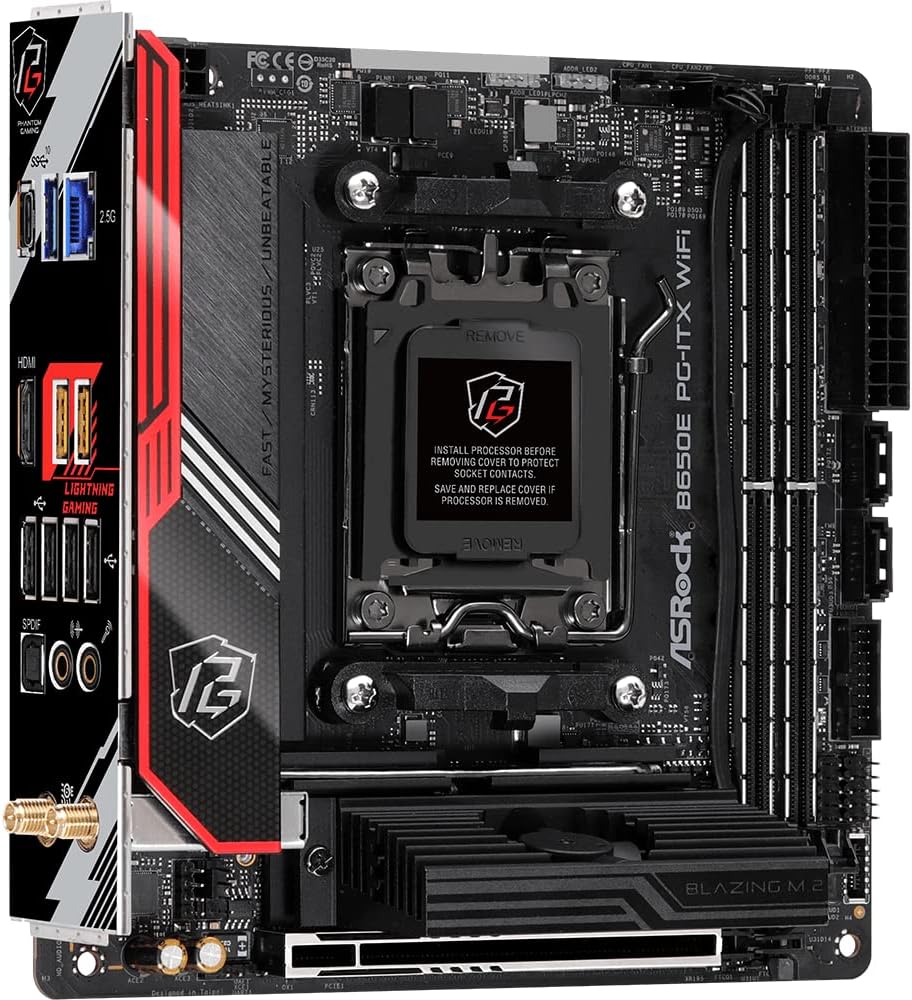
In terms of features, the B650E PG-ITX stands out with its use of the active M.2 heatsink with an embedded fan, which significantly improves thermals for the PCIe Gen 5 slot. Additionally, the board uses SMT-style PCIe slots for better signal quality and reliability. Despite its limited size as a mini ITX motherboard, the B650E PG-ITX offers adequate connectivity with two M.2 slots (one with PCIe 5.0 capability), two SATA ports, a 2.5 GbE LAN port, and WiFi 6E capability. The rear I/O is well-equipped with useful ports, including a USB 3.2 Gen 2 Type-C port and “Lightning Gaming” USB ports that are designed to improve signal reliability in gaming peripherals.
ASRock has ensured excellent build quality for the B650E PG-ITX, incorporating a 10-layer server-grade low-loss PCB to minimize interference and enhance signal integrity. The board also features steel reinforcement around PCIe and DIMM slots for better structural rigidity. The M.2 and chipset heatsink are well-built with heat pipe integration and active cooling for the primary M.2 slot. The design of the board is simple and understated, featuring a black PCB with VRM and M.2 heatsinks in the same color, with red and silver accents found throughout. While lacking RGB lighting, the overall look is inoffensive and suitable for various PC builds.
In essence, the ASRock B650E PG-ITX offers great value for money, thanks to its value-oriented B650E chipset. It stands out as one of the best AM5 motherboards in its price range, offering versatile features that make it an attractive mini ITX choice, even compared to larger ATX competitors in its category. Its reliable power delivery system and reasonable price tag make it an easy recommendation for enthusiasts who are looking to build a compact PC around the AM5 platform.
How we picked and tested
Selecting the ideal AM5 motherboard for the new Ryzen 7000 series processors presents its own challenges. While they target PC gamers seeking peak performance, the X670E and X670 motherboards currently in the market are exorbitantly priced, making them impractical for budget-conscious users looking to utilize this gaming CPU.
To address this, our focus was on identifying options that offer the best value for money when paired with the new AMD AM5 CPUs and compatible memory. We paid particular attention to X670E motherboards that provided excellent performance at a reasonable cost.
Additionally, we thoroughly examined the motherboards’ VRMs and other power delivery components. Although stock CPU performance remains more or less the same, the CPU benefits from a robust VRM configuration during overclocking.
The AMD AM5 platform boasts numerous new features and significant improvements compared to its predecessor. Thus, we made sure to consider only those motherboards equipped with features suitable for a high-end modern gaming setup.
Specifically, we closely scrutinized their storage, network, and connectivity options. AM5 motherboards with multiple M.2 slots supporting PCIe 5.0 for ultra-fast storage and graphics received preferential treatment.
Aesthetics were also a key consideration, though subjective in nature. Nevertheless, we incorporated user reviews of various motherboards and adjusted our rankings accordingly.
Throughout the testing process, our team of hardware experts spared no effort. To arrive at unbiased and data-driven assessments, each motherboard’s features were meticulously evaluated.
Comprehensive VRM testing was carried out, monitoring VRM temperatures on each board while an overclocked AMD Ryzen 9 7950X3D ran in a closed chassis for extended periods.
Based on the results of these rigorous tests, we have compiled a thorough and exhaustive list of the finest AM5 motherboards presently available on the market.
What’s New In AMD AM5?
AMD’s AM5 platform stands as a remarkable advancement in processor technology and signifies the conclusion of the longstanding AM4 platform that served for over four years. With the introduction of the Ryzen 7000 series CPUs, AMD has brought forth numerous substantial upgrades alongside the AM5 platform.
PCIe 5.0
A key advancement on the AM5 platform is the integration of PCIe 5.0, the latest version of the PCI Express specification. PCIe 5.0 brings significant improvements, offering double the bandwidth of PCIe 4.0 (32 GT/s compared to 16 GT/s) and reduced latency of only 12ns. These enhancements make it especially well-suited for high-performance applications like gaming PCs and data centers. With PCIe 5.0, the bandwidth can scale up to 128 GB/s across 16 lanes, and it maintains backward compatibility with PCIe 4.0 devices.
In comparison to the previous X570 motherboards, which supported a maximum of PCIe 4.0 for M.2 slots, the brand new AM5 motherboards now already support PCIe 5.0 in storage slots. This significant upgrade enables AM5 motherboards to accommodate the upcoming wave of PCIe 5.0 SSDs and other high-bandwidth devices. While PCIe 5.0 support is also available on the primary x16 PCIe slot to ensure future-proofing, its immediate impact on graphics cards is somewhat limited, as most graphics cards do not fully saturate the current PCIe 4.0 standard. Nonetheless, the AM5 platform is well-prepared for the next level of high-speed connectivity and storage capabilities.
DDR5 Memory
One notable improvement is the incorporation of DDR5 memory, representing the next generation of memory technology. DDR5 RAM brings several advantages compared to its predecessor. These include enhanced DIMM capacity, increased bandwidth, improved latency, reduced power consumption, and better error correction capabilities. Notably, the standard operating voltage has been lowered to 1.1V from DDR4’s 1.2V, resulting in improved efficiency and increased overclocking potential.
As a consequence of this shift, older DDR4 memory modules are no longer compatible. Nonetheless, AMD’s decision aligns with the industry’s widespread adoption of DDR5 as the new mainstream memory technology. Although DDR5 memory kits may be slightly more expensive than DDR4 kits at the moment, their future-proofing qualities make them a worthwhile investment. AMD has clearly developed the new Zen 4 architecture with DDR5 memory in mind, recognizing the crucial role memory plays in enhancing the performance of Ryzen processors.
New Chipsets
AMD’s introduction of the AM5 platform comes with the release of two new chipsets, catering to different price points and introducing a range of fresh features. Moreover, each chipset has two variations, with the “E” variant specifically designed to offer expanded overclocking support and additional PCIe 5.0 lanes.
- X670E: The X670E platform is the most premium chipset designed for the most high-performance Ryzen CPUs. It features 44 PCIe lanes with 24 PCIe 5.0 lanes, as well as 2 USB 20 Gbps ports.
- X670: The X670 chipset is the standard high-end chipset with 44 PCIe lanes, 8 of which are PCIe 5.0 lanes. It also features 2 USB 20 Gbps ports.
- B650E: The B650E chipset is the mid-range chipset of the AM5 platform with 36 PCIe lanes, 24 of which are PCIe 5.0 lanes. It features only one USB 20 Gbps port.
- B650: The number of total PCIe lanes remains 36, but there are no PCIe 5.0 lanes. You also only get one USB 20 Gbps port.
Buyer’s Guide
The introduction of the AMD AM5 platform doesn’t make the motherboard selection process any easier, which has always been notoriously challenging. Acquiring a brand-new Ryzen 7000 series CPU will require you to invest in a new motherboard, but determining how much to spend on a motherboard is a subjective matter with an unpredictable answer. If you’re considering purchasing a new motherboard, it’s essential to carefully consider these factors.
Form Factor
Considering the form factor of the AM5 motherboard is crucial, as it determines the physical size and layout of the motherboard, which impacts the overall design and compatibility of your PC build. Common form factors for AM5 motherboards include ATX, microATX, and Mini-ITX, each offering varying sizes and features. Choosing the right form factor depends on your PC case size and the number of expansion slots and connectivity options you require. ATX provides ample room for upgrades and expansion, microATX strikes a balance between size and features, while Mini-ITX is ideal for compact and portable builds with limited space. Picking the appropriate form factor ensures a seamless fit and functionality within your chosen PC case.
Power Delivery
When purchasing a new AM5 motherboard, it is imperative to carefully assess the VRM (Voltage Regulator Module) design and power delivery capabilities. A robust VRM design with high-quality components ensures stable and efficient power delivery to the CPU, which is essential for optimal performance and system reliability. Additionally, a motherboard with a robust VRM solution can provide better overclocking potential for enthusiasts and handle higher power draw from advanced processors, ensuring future compatibility and longevity of the system.
Storage, Networking, and Connectivity
While searching for an AM5 motherboard, it is essential to consider its features, particularly networking, storage, and connectivity options. Look for motherboards with reliable and fast networking solutions, such as 2.5 Gigabit Ethernet or Wi-Fi 6/6E, to ensure seamless online experiences. Ample storage options, like multiple PCIe 4.0 M.2 slots and SATA ports, allow for flexible storage configurations, accommodating fast NVMe SSDs and traditional hard drives. Additionally, having a variety of connectivity ports, such as USB 3.2 Gen2x2/Gen2, Type-C, and Thunderbolt, can enhance versatility and connectivity with external devices and peripherals.
Aesthetics
Considering aesthetics is another crucial aspect when selecting an AM5 motherboard. The motherboard’s appearance can play a significant role in building an aesthetically pleasing and cohesive PC setup. Look for motherboards with well-designed heatsinks, RGB lighting options, and customizable LED effects that match your overall build theme. Many motherboards even come with screens nowadays that can be configured to show a personalized image or message. A visually appealing motherboard not only enhances the overall look of your system but also adds a touch of personalization to your gaming or workstation rig.
Value for Money
While it’s tempting to go for high-end and feature-rich options, it’s crucial to balance the motherboard’s price with the features and performance it offers. Assess your specific needs and requirements, and then compare different models to find a motherboard that provides the necessary features and quality without overpaying for extras you might not utilize fully. Prioritize essential elements like reliable power delivery, adequate connectivity options, and future-proofing capabilities while staying within your budget to ensure the best value for your investment. A cheaper motherboard is not necessarily the best option for your particular build, and vice versa.
Upgrade Path
Evaluating the upgrade path is a vital aspect of purchasing an AM5 motherboard. When selecting a motherboard, it is important to consider its compatibility with future processor generations and other components. AMD has a good track record of supporting the same socket for a long time, so unless there are any unpleasant surprises, the upgrade path should be pretty decent. Additionally, check for expansion slots and connectivity options to accommodate potential upgrades, such as additional GPUs or storage devices, to ensure the longevity and adaptability of your system.
If you’re looking for a detailed breakdown of the motherboard purchase process, then be sure to check out our comprehensive motherboard buying guide for even more shopping tips.
Why you should trust us
Appuals.com is your go-to source for motherboard expertise, with comprehensive reviews from our experienced team. Our rigorous testing process assesses stability, compatibility, and overclocking potential, while our VRM testing ensures long-term reliability. Whether you’re looking for a budget-friendly option or the best motherboard on the market, we’ve got you covered. Read more about us.
Best AM5 Motherboard in 2024 - FAQs
No, you cannot use DDR4 memory with AM5 motherboards. The new AM5 motherboards are exclusively compatible with DDR5 memory only, which means that your DDR4 modules will not work on it.
The X670E platform is the most high-end version of the X-series chipsets in the AM5 motherboard lineup, with 44 total PCIe lanes and 24 PCIe 5.0 lanes. X670, on the other hand, has 44 total PCIe lanes too, but only 8 of them are PCIe 5.0 compatible.
No, the AMD Ryzen 9 5950X is not compatible with AM5 motherboards. It is compatible with the AM4 socket only, and you should use an X570 or B550 motherboard with the Ryzen 9 5950X.
The AMD AM5 motherboards use the new AM5 socket, which is a departure from the outgoing AM4 socket. Unlike the previous AMD sockets, AM5 uses an LGA (land grid array) design with 1718 pins instead of a traditional PGA (pin grid array) design. Moreover, the socket also has increased power output capacities for more power-hungry AM5 CPUs.
One cannot say for certain how long will the AMD AM5 platform be supported by AM5, but if precedence is anything to go by, the AM5 platform is here to stay. AMD supported the AM4 platform for well over 4 years, and the same is expected of them for the new AM5 platform.
 Check Price
Check Price